Domino's Pizza Case Study: Leadership, Management, and Ethical Issues
VerifiedAdded on 2020/03/07
|10
|2306
|341
Case Study
AI Summary
This case study analyzes the leadership and management practices at Domino's Pizza, highlighting challenges such as autocratic leadership, employee exploitation, and ethical concerns within the franchise model. It explores the company's background, including its rapid growth and expansion, and identifies key issues like poor working conditions, lack of communication, and the centralization of power. The study examines the impact of these issues on employee morale and productivity. The analysis proposes several solutions, including the implementation of effective reward systems, improved communication channels, policies to hold franchise managers accountable, and the creation of a platform for anonymous employee complaints. The recommendations emphasize the importance of ethical business practices, fair employee treatment, and a conducive work environment to promote cohesion, minimize exploitation, and maintain good sales. The case study underscores the need for proactive measures to address leadership deficiencies and ensure the long-term success of the organization.
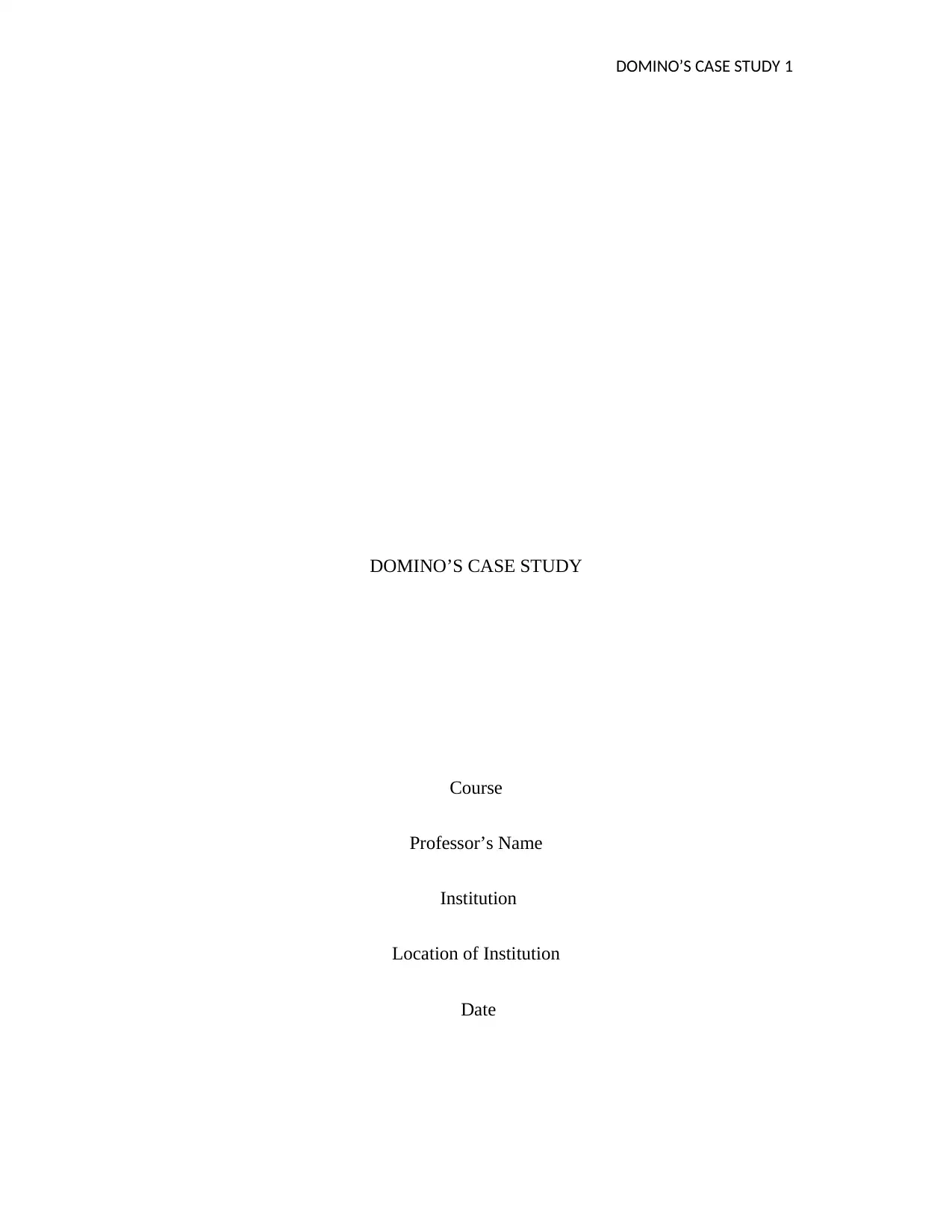
DOMINO’S CASE STUDY 1
DOMINO’S CASE STUDY
Course
Professor’s Name
Institution
Location of Institution
Date
DOMINO’S CASE STUDY
Course
Professor’s Name
Institution
Location of Institution
Date
Paraphrase This Document
Need a fresh take? Get an instant paraphrase of this document with our AI Paraphraser
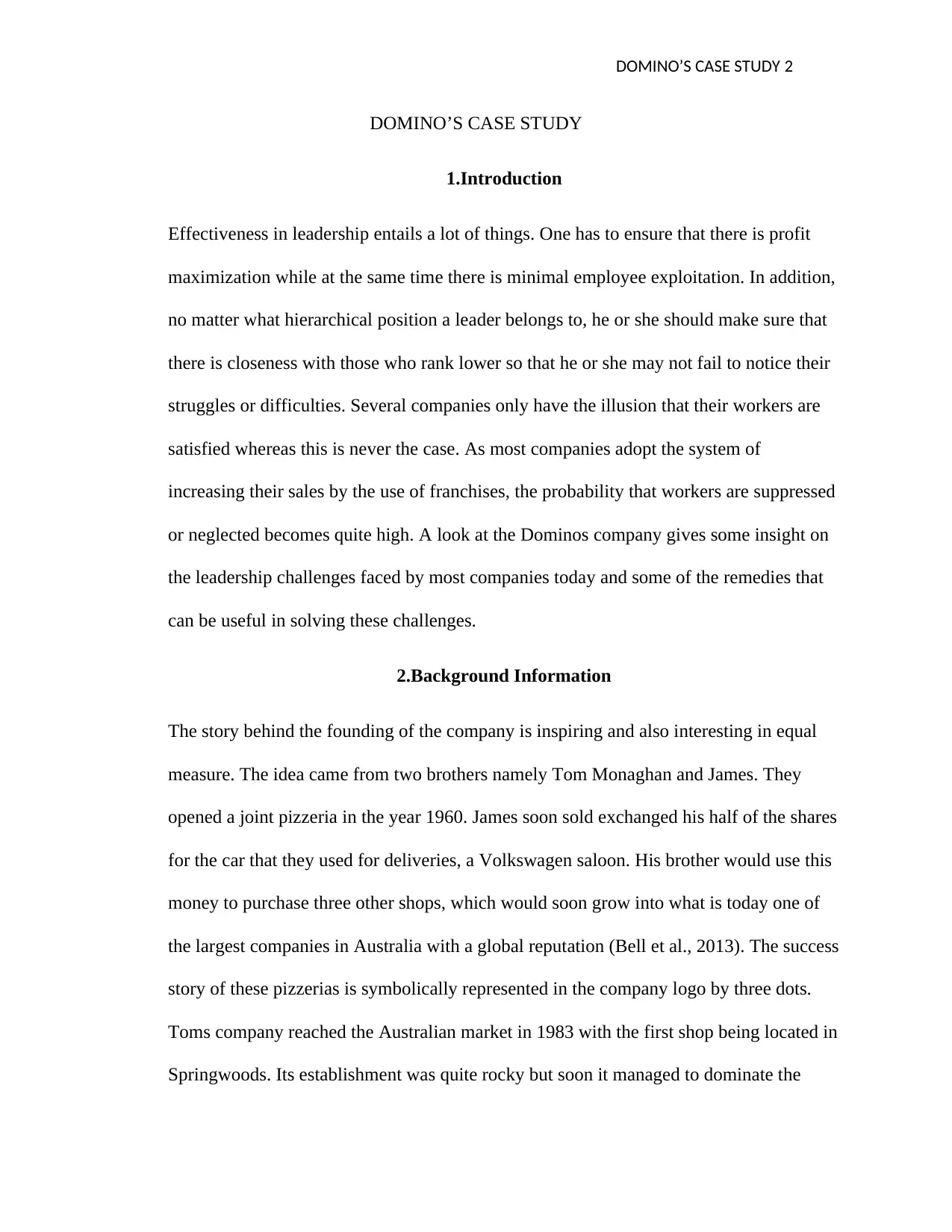
DOMINO’S CASE STUDY 2
DOMINO’S CASE STUDY
1.Introduction
Effectiveness in leadership entails a lot of things. One has to ensure that there is profit
maximization while at the same time there is minimal employee exploitation. In addition,
no matter what hierarchical position a leader belongs to, he or she should make sure that
there is closeness with those who rank lower so that he or she may not fail to notice their
struggles or difficulties. Several companies only have the illusion that their workers are
satisfied whereas this is never the case. As most companies adopt the system of
increasing their sales by the use of franchises, the probability that workers are suppressed
or neglected becomes quite high. A look at the Dominos company gives some insight on
the leadership challenges faced by most companies today and some of the remedies that
can be useful in solving these challenges.
2.Background Information
The story behind the founding of the company is inspiring and also interesting in equal
measure. The idea came from two brothers namely Tom Monaghan and James. They
opened a joint pizzeria in the year 1960. James soon sold exchanged his half of the shares
for the car that they used for deliveries, a Volkswagen saloon. His brother would use this
money to purchase three other shops, which would soon grow into what is today one of
the largest companies in Australia with a global reputation (Bell et al., 2013). The success
story of these pizzerias is symbolically represented in the company logo by three dots.
Toms company reached the Australian market in 1983 with the first shop being located in
Springwoods. Its establishment was quite rocky but soon it managed to dominate the
DOMINO’S CASE STUDY
1.Introduction
Effectiveness in leadership entails a lot of things. One has to ensure that there is profit
maximization while at the same time there is minimal employee exploitation. In addition,
no matter what hierarchical position a leader belongs to, he or she should make sure that
there is closeness with those who rank lower so that he or she may not fail to notice their
struggles or difficulties. Several companies only have the illusion that their workers are
satisfied whereas this is never the case. As most companies adopt the system of
increasing their sales by the use of franchises, the probability that workers are suppressed
or neglected becomes quite high. A look at the Dominos company gives some insight on
the leadership challenges faced by most companies today and some of the remedies that
can be useful in solving these challenges.
2.Background Information
The story behind the founding of the company is inspiring and also interesting in equal
measure. The idea came from two brothers namely Tom Monaghan and James. They
opened a joint pizzeria in the year 1960. James soon sold exchanged his half of the shares
for the car that they used for deliveries, a Volkswagen saloon. His brother would use this
money to purchase three other shops, which would soon grow into what is today one of
the largest companies in Australia with a global reputation (Bell et al., 2013). The success
story of these pizzerias is symbolically represented in the company logo by three dots.
Toms company reached the Australian market in 1983 with the first shop being located in
Springwoods. Its establishment was quite rocky but soon it managed to dominate the
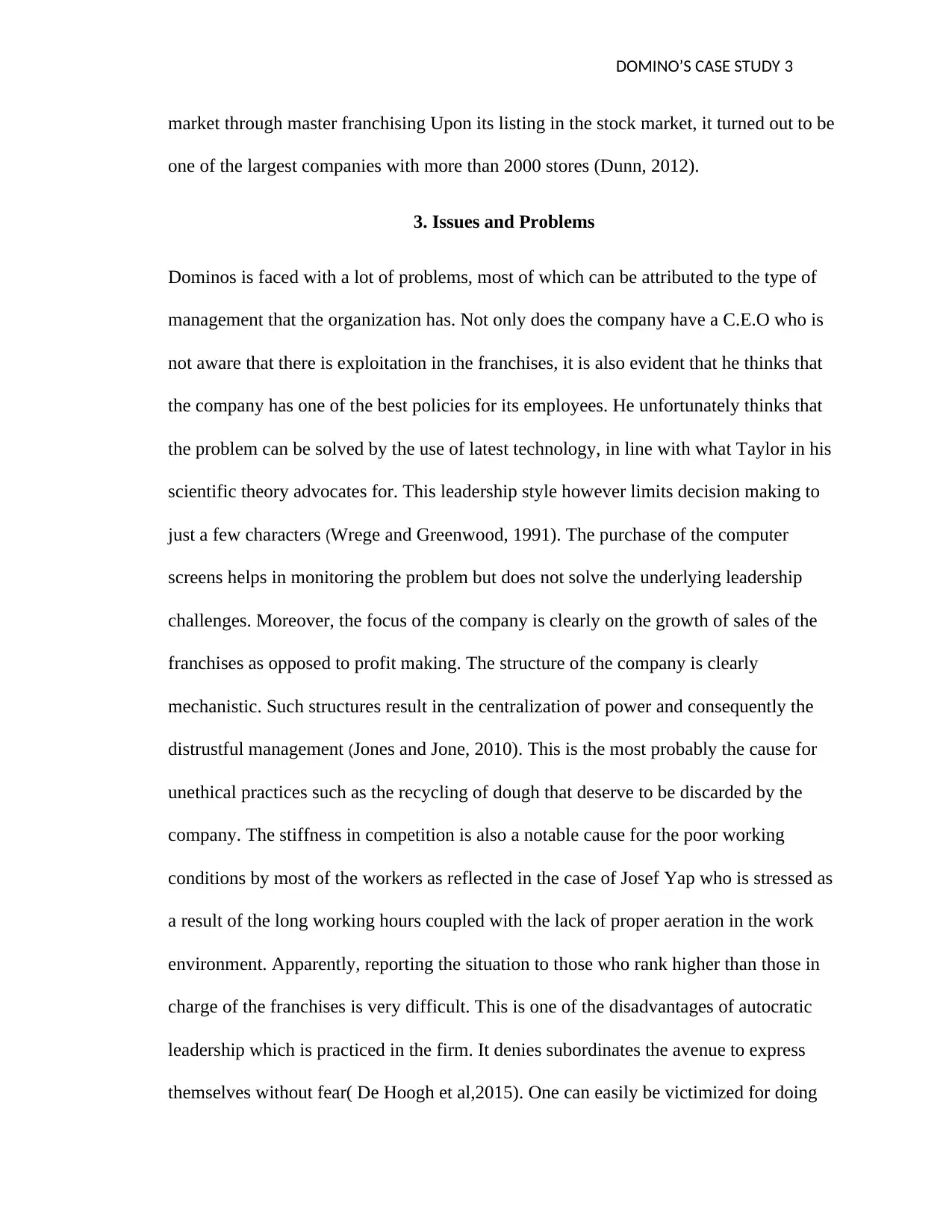
DOMINO’S CASE STUDY 3
market through master franchising Upon its listing in the stock market, it turned out to be
one of the largest companies with more than 2000 stores (Dunn, 2012).
3. Issues and Problems
Dominos is faced with a lot of problems, most of which can be attributed to the type of
management that the organization has. Not only does the company have a C.E.O who is
not aware that there is exploitation in the franchises, it is also evident that he thinks that
the company has one of the best policies for its employees. He unfortunately thinks that
the problem can be solved by the use of latest technology, in line with what Taylor in his
scientific theory advocates for. This leadership style however limits decision making to
just a few characters (Wrege and Greenwood, 1991). The purchase of the computer
screens helps in monitoring the problem but does not solve the underlying leadership
challenges. Moreover, the focus of the company is clearly on the growth of sales of the
franchises as opposed to profit making. The structure of the company is clearly
mechanistic. Such structures result in the centralization of power and consequently the
distrustful management (Jones and Jone, 2010). This is the most probably the cause for
unethical practices such as the recycling of dough that deserve to be discarded by the
company. The stiffness in competition is also a notable cause for the poor working
conditions by most of the workers as reflected in the case of Josef Yap who is stressed as
a result of the long working hours coupled with the lack of proper aeration in the work
environment. Apparently, reporting the situation to those who rank higher than those in
charge of the franchises is very difficult. This is one of the disadvantages of autocratic
leadership which is practiced in the firm. It denies subordinates the avenue to express
themselves without fear( De Hoogh et al,2015). One can easily be victimized for doing
market through master franchising Upon its listing in the stock market, it turned out to be
one of the largest companies with more than 2000 stores (Dunn, 2012).
3. Issues and Problems
Dominos is faced with a lot of problems, most of which can be attributed to the type of
management that the organization has. Not only does the company have a C.E.O who is
not aware that there is exploitation in the franchises, it is also evident that he thinks that
the company has one of the best policies for its employees. He unfortunately thinks that
the problem can be solved by the use of latest technology, in line with what Taylor in his
scientific theory advocates for. This leadership style however limits decision making to
just a few characters (Wrege and Greenwood, 1991). The purchase of the computer
screens helps in monitoring the problem but does not solve the underlying leadership
challenges. Moreover, the focus of the company is clearly on the growth of sales of the
franchises as opposed to profit making. The structure of the company is clearly
mechanistic. Such structures result in the centralization of power and consequently the
distrustful management (Jones and Jone, 2010). This is the most probably the cause for
unethical practices such as the recycling of dough that deserve to be discarded by the
company. The stiffness in competition is also a notable cause for the poor working
conditions by most of the workers as reflected in the case of Josef Yap who is stressed as
a result of the long working hours coupled with the lack of proper aeration in the work
environment. Apparently, reporting the situation to those who rank higher than those in
charge of the franchises is very difficult. This is one of the disadvantages of autocratic
leadership which is practiced in the firm. It denies subordinates the avenue to express
themselves without fear( De Hoogh et al,2015). One can easily be victimized for doing
⊘ This is a preview!⊘
Do you want full access?
Subscribe today to unlock all pages.

Trusted by 1+ million students worldwide
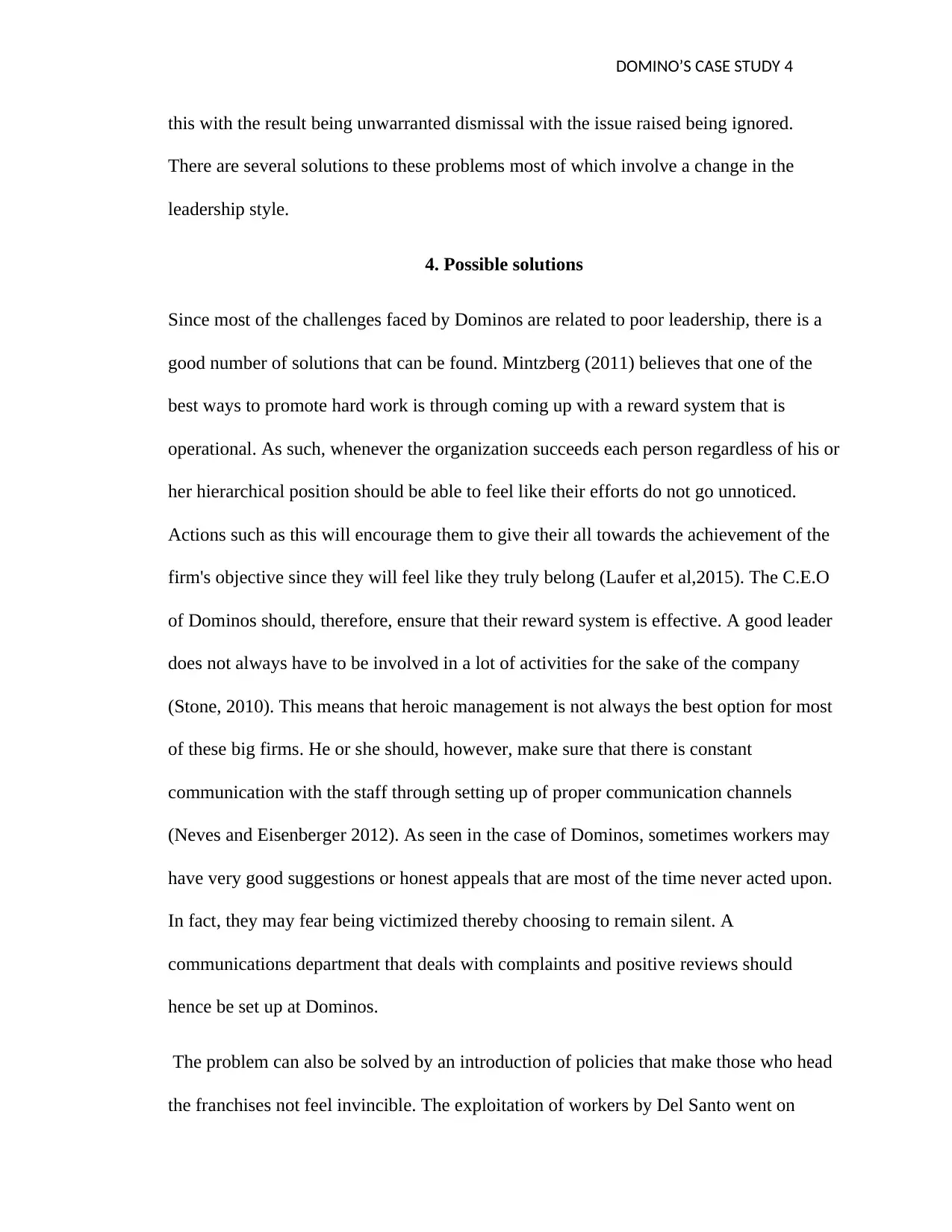
DOMINO’S CASE STUDY 4
this with the result being unwarranted dismissal with the issue raised being ignored.
There are several solutions to these problems most of which involve a change in the
leadership style.
4. Possible solutions
Since most of the challenges faced by Dominos are related to poor leadership, there is a
good number of solutions that can be found. Mintzberg (2011) believes that one of the
best ways to promote hard work is through coming up with a reward system that is
operational. As such, whenever the organization succeeds each person regardless of his or
her hierarchical position should be able to feel like their efforts do not go unnoticed.
Actions such as this will encourage them to give their all towards the achievement of the
firm's objective since they will feel like they truly belong (Laufer et al,2015). The C.E.O
of Dominos should, therefore, ensure that their reward system is effective. A good leader
does not always have to be involved in a lot of activities for the sake of the company
(Stone, 2010). This means that heroic management is not always the best option for most
of these big firms. He or she should, however, make sure that there is constant
communication with the staff through setting up of proper communication channels
(Neves and Eisenberger 2012). As seen in the case of Dominos, sometimes workers may
have very good suggestions or honest appeals that are most of the time never acted upon.
In fact, they may fear being victimized thereby choosing to remain silent. A
communications department that deals with complaints and positive reviews should
hence be set up at Dominos.
The problem can also be solved by an introduction of policies that make those who head
the franchises not feel invincible. The exploitation of workers by Del Santo went on
this with the result being unwarranted dismissal with the issue raised being ignored.
There are several solutions to these problems most of which involve a change in the
leadership style.
4. Possible solutions
Since most of the challenges faced by Dominos are related to poor leadership, there is a
good number of solutions that can be found. Mintzberg (2011) believes that one of the
best ways to promote hard work is through coming up with a reward system that is
operational. As such, whenever the organization succeeds each person regardless of his or
her hierarchical position should be able to feel like their efforts do not go unnoticed.
Actions such as this will encourage them to give their all towards the achievement of the
firm's objective since they will feel like they truly belong (Laufer et al,2015). The C.E.O
of Dominos should, therefore, ensure that their reward system is effective. A good leader
does not always have to be involved in a lot of activities for the sake of the company
(Stone, 2010). This means that heroic management is not always the best option for most
of these big firms. He or she should, however, make sure that there is constant
communication with the staff through setting up of proper communication channels
(Neves and Eisenberger 2012). As seen in the case of Dominos, sometimes workers may
have very good suggestions or honest appeals that are most of the time never acted upon.
In fact, they may fear being victimized thereby choosing to remain silent. A
communications department that deals with complaints and positive reviews should
hence be set up at Dominos.
The problem can also be solved by an introduction of policies that make those who head
the franchises not feel invincible. The exploitation of workers by Del Santo went on
Paraphrase This Document
Need a fresh take? Get an instant paraphrase of this document with our AI Paraphraser
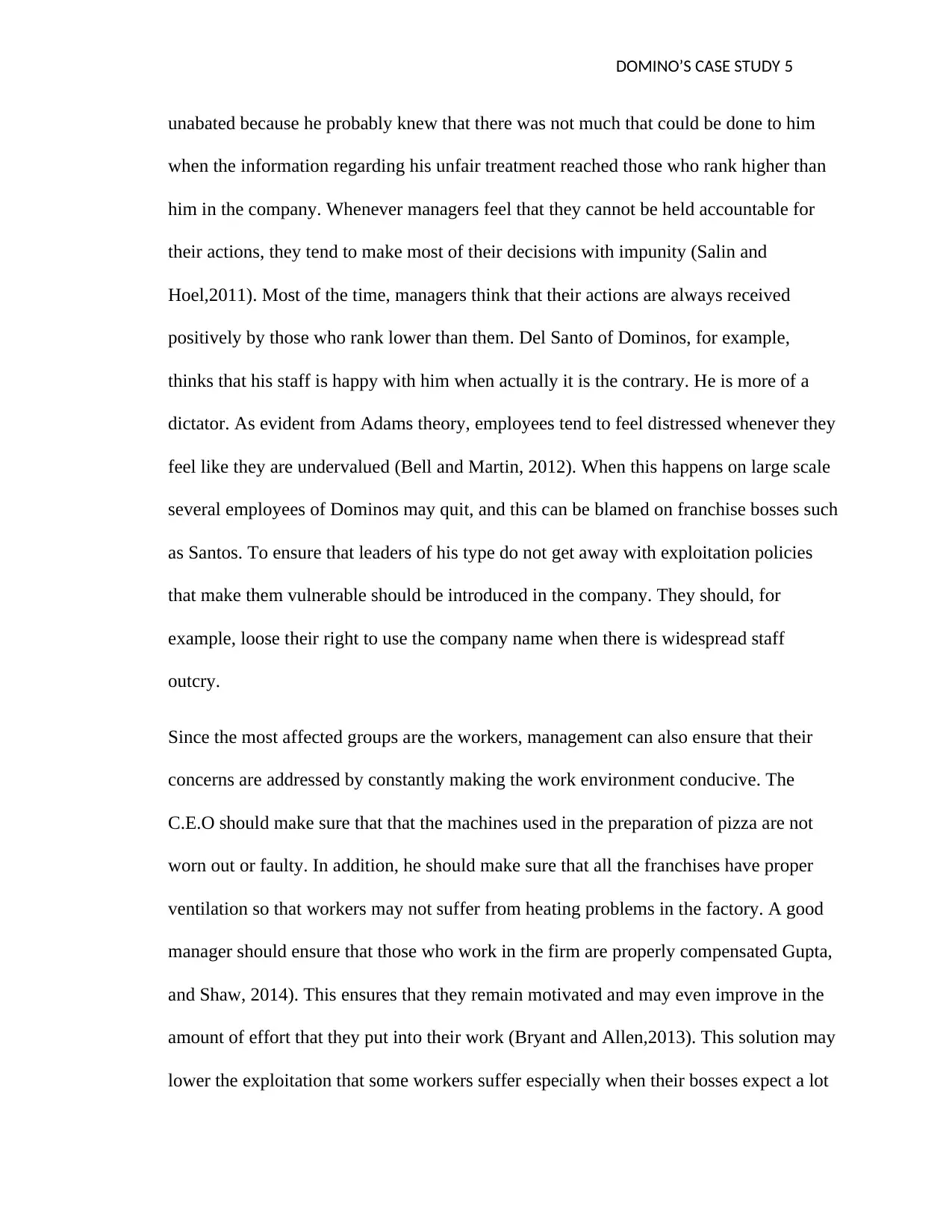
DOMINO’S CASE STUDY 5
unabated because he probably knew that there was not much that could be done to him
when the information regarding his unfair treatment reached those who rank higher than
him in the company. Whenever managers feel that they cannot be held accountable for
their actions, they tend to make most of their decisions with impunity (Salin and
Hoel,2011). Most of the time, managers think that their actions are always received
positively by those who rank lower than them. Del Santo of Dominos, for example,
thinks that his staff is happy with him when actually it is the contrary. He is more of a
dictator. As evident from Adams theory, employees tend to feel distressed whenever they
feel like they are undervalued (Bell and Martin, 2012). When this happens on large scale
several employees of Dominos may quit, and this can be blamed on franchise bosses such
as Santos. To ensure that leaders of his type do not get away with exploitation policies
that make them vulnerable should be introduced in the company. They should, for
example, loose their right to use the company name when there is widespread staff
outcry.
Since the most affected groups are the workers, management can also ensure that their
concerns are addressed by constantly making the work environment conducive. The
C.E.O should make sure that that the machines used in the preparation of pizza are not
worn out or faulty. In addition, he should make sure that all the franchises have proper
ventilation so that workers may not suffer from heating problems in the factory. A good
manager should ensure that those who work in the firm are properly compensated Gupta,
and Shaw, 2014). This ensures that they remain motivated and may even improve in the
amount of effort that they put into their work (Bryant and Allen,2013). This solution may
lower the exploitation that some workers suffer especially when their bosses expect a lot
unabated because he probably knew that there was not much that could be done to him
when the information regarding his unfair treatment reached those who rank higher than
him in the company. Whenever managers feel that they cannot be held accountable for
their actions, they tend to make most of their decisions with impunity (Salin and
Hoel,2011). Most of the time, managers think that their actions are always received
positively by those who rank lower than them. Del Santo of Dominos, for example,
thinks that his staff is happy with him when actually it is the contrary. He is more of a
dictator. As evident from Adams theory, employees tend to feel distressed whenever they
feel like they are undervalued (Bell and Martin, 2012). When this happens on large scale
several employees of Dominos may quit, and this can be blamed on franchise bosses such
as Santos. To ensure that leaders of his type do not get away with exploitation policies
that make them vulnerable should be introduced in the company. They should, for
example, loose their right to use the company name when there is widespread staff
outcry.
Since the most affected groups are the workers, management can also ensure that their
concerns are addressed by constantly making the work environment conducive. The
C.E.O should make sure that that the machines used in the preparation of pizza are not
worn out or faulty. In addition, he should make sure that all the franchises have proper
ventilation so that workers may not suffer from heating problems in the factory. A good
manager should ensure that those who work in the firm are properly compensated Gupta,
and Shaw, 2014). This ensures that they remain motivated and may even improve in the
amount of effort that they put into their work (Bryant and Allen,2013). This solution may
lower the exploitation that some workers suffer especially when their bosses expect a lot
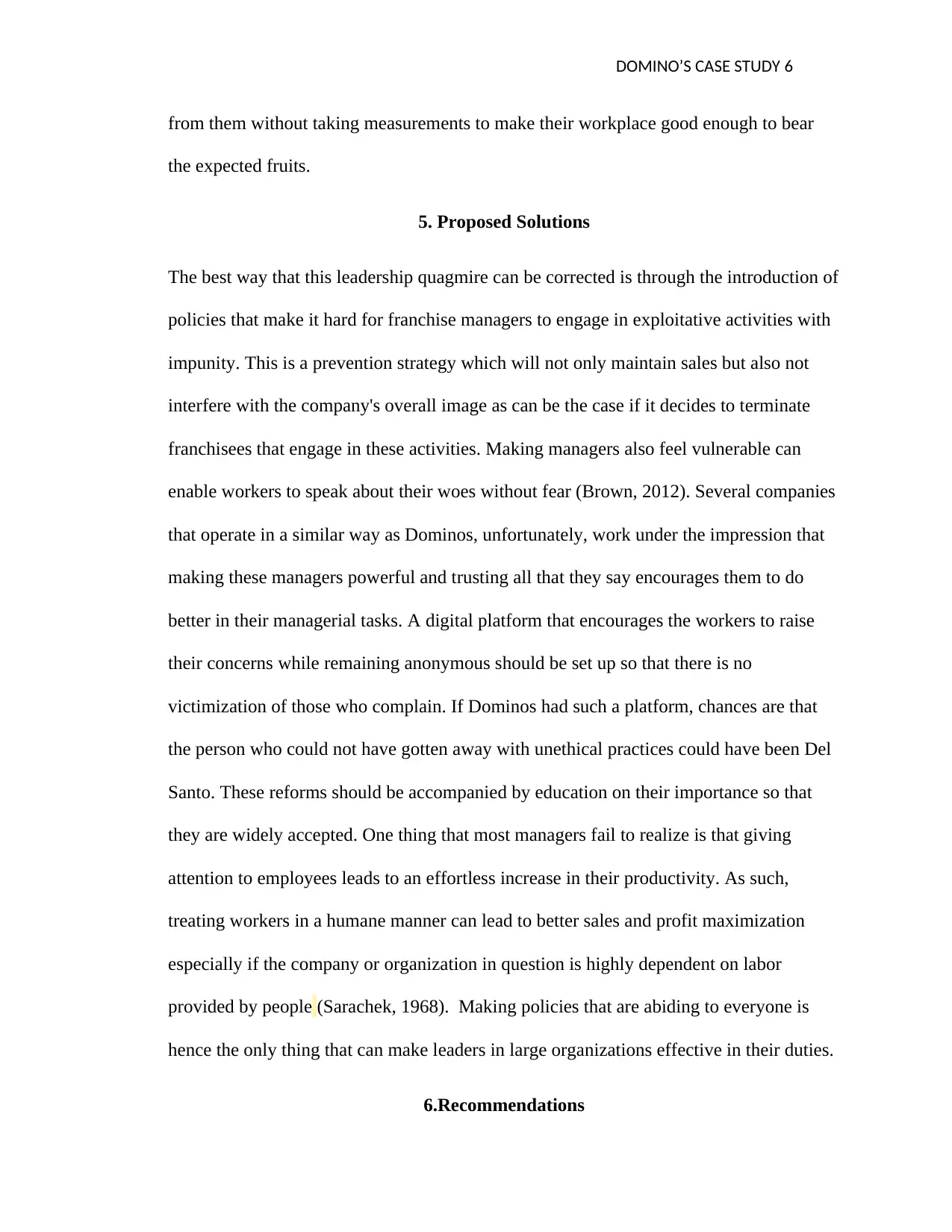
DOMINO’S CASE STUDY 6
from them without taking measurements to make their workplace good enough to bear
the expected fruits.
5. Proposed Solutions
The best way that this leadership quagmire can be corrected is through the introduction of
policies that make it hard for franchise managers to engage in exploitative activities with
impunity. This is a prevention strategy which will not only maintain sales but also not
interfere with the company's overall image as can be the case if it decides to terminate
franchisees that engage in these activities. Making managers also feel vulnerable can
enable workers to speak about their woes without fear (Brown, 2012). Several companies
that operate in a similar way as Dominos, unfortunately, work under the impression that
making these managers powerful and trusting all that they say encourages them to do
better in their managerial tasks. A digital platform that encourages the workers to raise
their concerns while remaining anonymous should be set up so that there is no
victimization of those who complain. If Dominos had such a platform, chances are that
the person who could not have gotten away with unethical practices could have been Del
Santo. These reforms should be accompanied by education on their importance so that
they are widely accepted. One thing that most managers fail to realize is that giving
attention to employees leads to an effortless increase in their productivity. As such,
treating workers in a humane manner can lead to better sales and profit maximization
especially if the company or organization in question is highly dependent on labor
provided by people (Sarachek, 1968). Making policies that are abiding to everyone is
hence the only thing that can make leaders in large organizations effective in their duties.
6.Recommendations
from them without taking measurements to make their workplace good enough to bear
the expected fruits.
5. Proposed Solutions
The best way that this leadership quagmire can be corrected is through the introduction of
policies that make it hard for franchise managers to engage in exploitative activities with
impunity. This is a prevention strategy which will not only maintain sales but also not
interfere with the company's overall image as can be the case if it decides to terminate
franchisees that engage in these activities. Making managers also feel vulnerable can
enable workers to speak about their woes without fear (Brown, 2012). Several companies
that operate in a similar way as Dominos, unfortunately, work under the impression that
making these managers powerful and trusting all that they say encourages them to do
better in their managerial tasks. A digital platform that encourages the workers to raise
their concerns while remaining anonymous should be set up so that there is no
victimization of those who complain. If Dominos had such a platform, chances are that
the person who could not have gotten away with unethical practices could have been Del
Santo. These reforms should be accompanied by education on their importance so that
they are widely accepted. One thing that most managers fail to realize is that giving
attention to employees leads to an effortless increase in their productivity. As such,
treating workers in a humane manner can lead to better sales and profit maximization
especially if the company or organization in question is highly dependent on labor
provided by people (Sarachek, 1968). Making policies that are abiding to everyone is
hence the only thing that can make leaders in large organizations effective in their duties.
6.Recommendations
⊘ This is a preview!⊘
Do you want full access?
Subscribe today to unlock all pages.

Trusted by 1+ million students worldwide
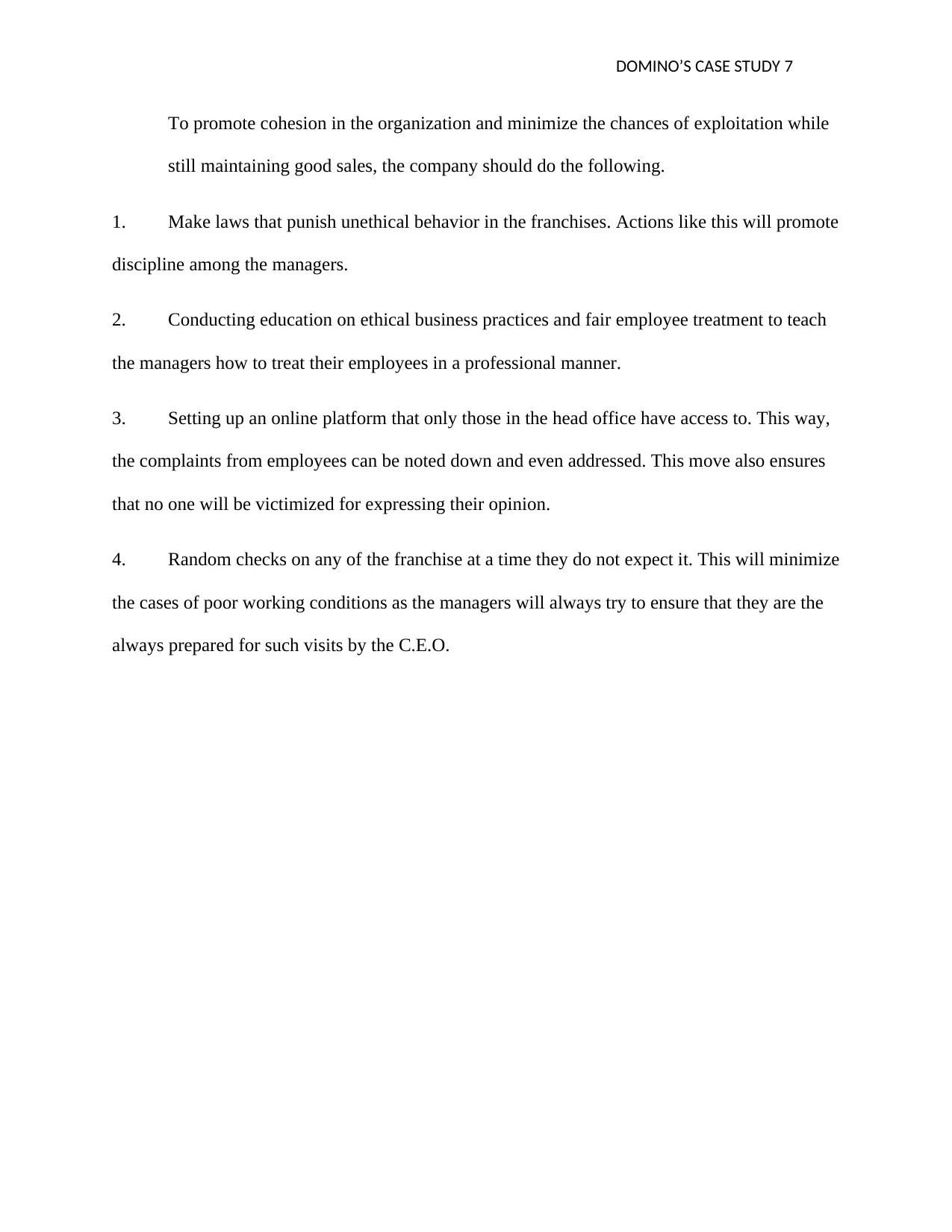
DOMINO’S CASE STUDY 7
To promote cohesion in the organization and minimize the chances of exploitation while
still maintaining good sales, the company should do the following.
1. Make laws that punish unethical behavior in the franchises. Actions like this will promote
discipline among the managers.
2. Conducting education on ethical business practices and fair employee treatment to teach
the managers how to treat their employees in a professional manner.
3. Setting up an online platform that only those in the head office have access to. This way,
the complaints from employees can be noted down and even addressed. This move also ensures
that no one will be victimized for expressing their opinion.
4. Random checks on any of the franchise at a time they do not expect it. This will minimize
the cases of poor working conditions as the managers will always try to ensure that they are the
always prepared for such visits by the C.E.O.
To promote cohesion in the organization and minimize the chances of exploitation while
still maintaining good sales, the company should do the following.
1. Make laws that punish unethical behavior in the franchises. Actions like this will promote
discipline among the managers.
2. Conducting education on ethical business practices and fair employee treatment to teach
the managers how to treat their employees in a professional manner.
3. Setting up an online platform that only those in the head office have access to. This way,
the complaints from employees can be noted down and even addressed. This move also ensures
that no one will be victimized for expressing their opinion.
4. Random checks on any of the franchise at a time they do not expect it. This will minimize
the cases of poor working conditions as the managers will always try to ensure that they are the
always prepared for such visits by the C.E.O.
Paraphrase This Document
Need a fresh take? Get an instant paraphrase of this document with our AI Paraphraser
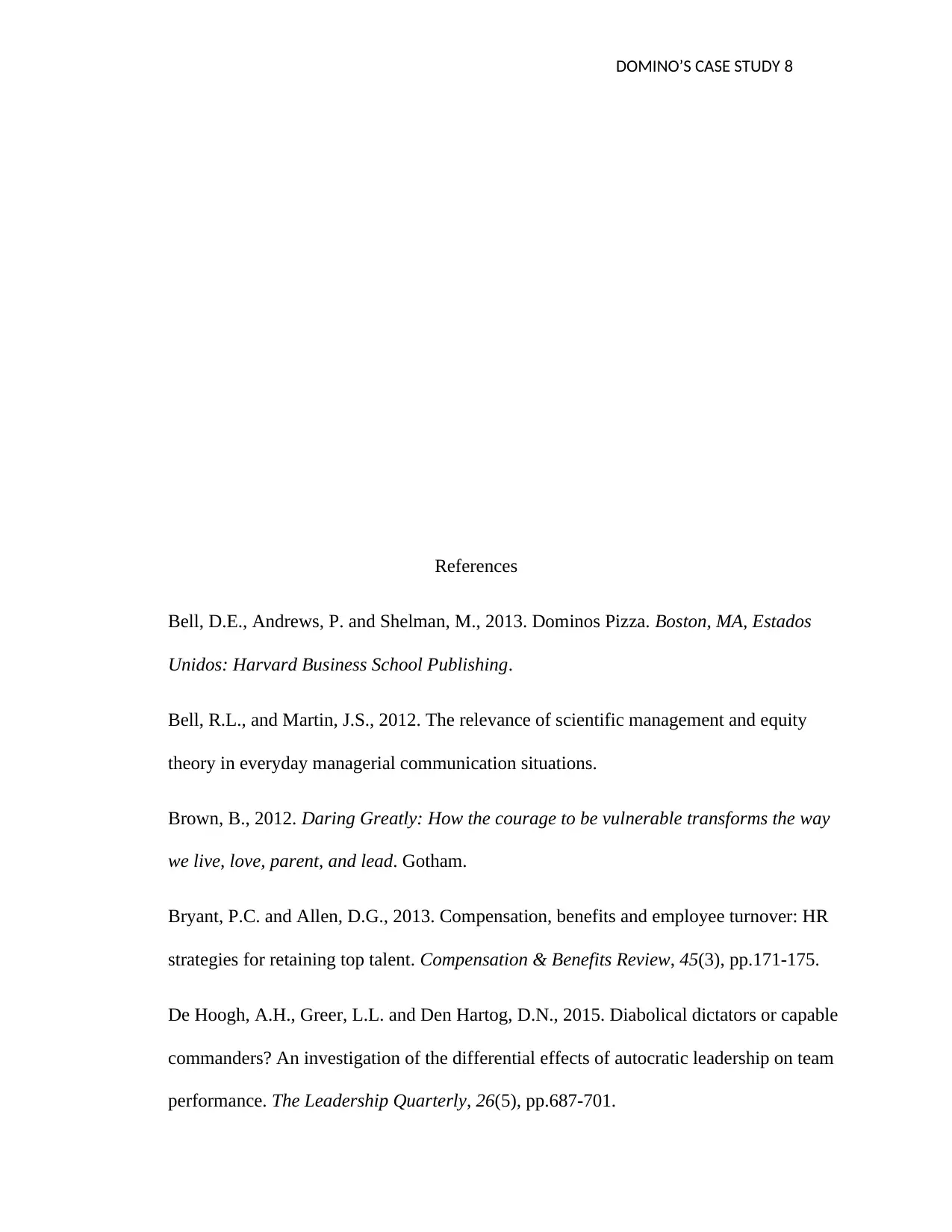
DOMINO’S CASE STUDY 8
References
Bell, D.E., Andrews, P. and Shelman, M., 2013. Dominos Pizza. Boston, MA, Estados
Unidos: Harvard Business School Publishing.
Bell, R.L., and Martin, J.S., 2012. The relevance of scientific management and equity
theory in everyday managerial communication situations.
Brown, B., 2012. Daring Greatly: How the courage to be vulnerable transforms the way
we live, love, parent, and lead. Gotham.
Bryant, P.C. and Allen, D.G., 2013. Compensation, benefits and employee turnover: HR
strategies for retaining top talent. Compensation & Benefits Review, 45(3), pp.171-175.
De Hoogh, A.H., Greer, L.L. and Den Hartog, D.N., 2015. Diabolical dictators or capable
commanders? An investigation of the differential effects of autocratic leadership on team
performance. The Leadership Quarterly, 26(5), pp.687-701.
References
Bell, D.E., Andrews, P. and Shelman, M., 2013. Dominos Pizza. Boston, MA, Estados
Unidos: Harvard Business School Publishing.
Bell, R.L., and Martin, J.S., 2012. The relevance of scientific management and equity
theory in everyday managerial communication situations.
Brown, B., 2012. Daring Greatly: How the courage to be vulnerable transforms the way
we live, love, parent, and lead. Gotham.
Bryant, P.C. and Allen, D.G., 2013. Compensation, benefits and employee turnover: HR
strategies for retaining top talent. Compensation & Benefits Review, 45(3), pp.171-175.
De Hoogh, A.H., Greer, L.L. and Den Hartog, D.N., 2015. Diabolical dictators or capable
commanders? An investigation of the differential effects of autocratic leadership on team
performance. The Leadership Quarterly, 26(5), pp.687-701.
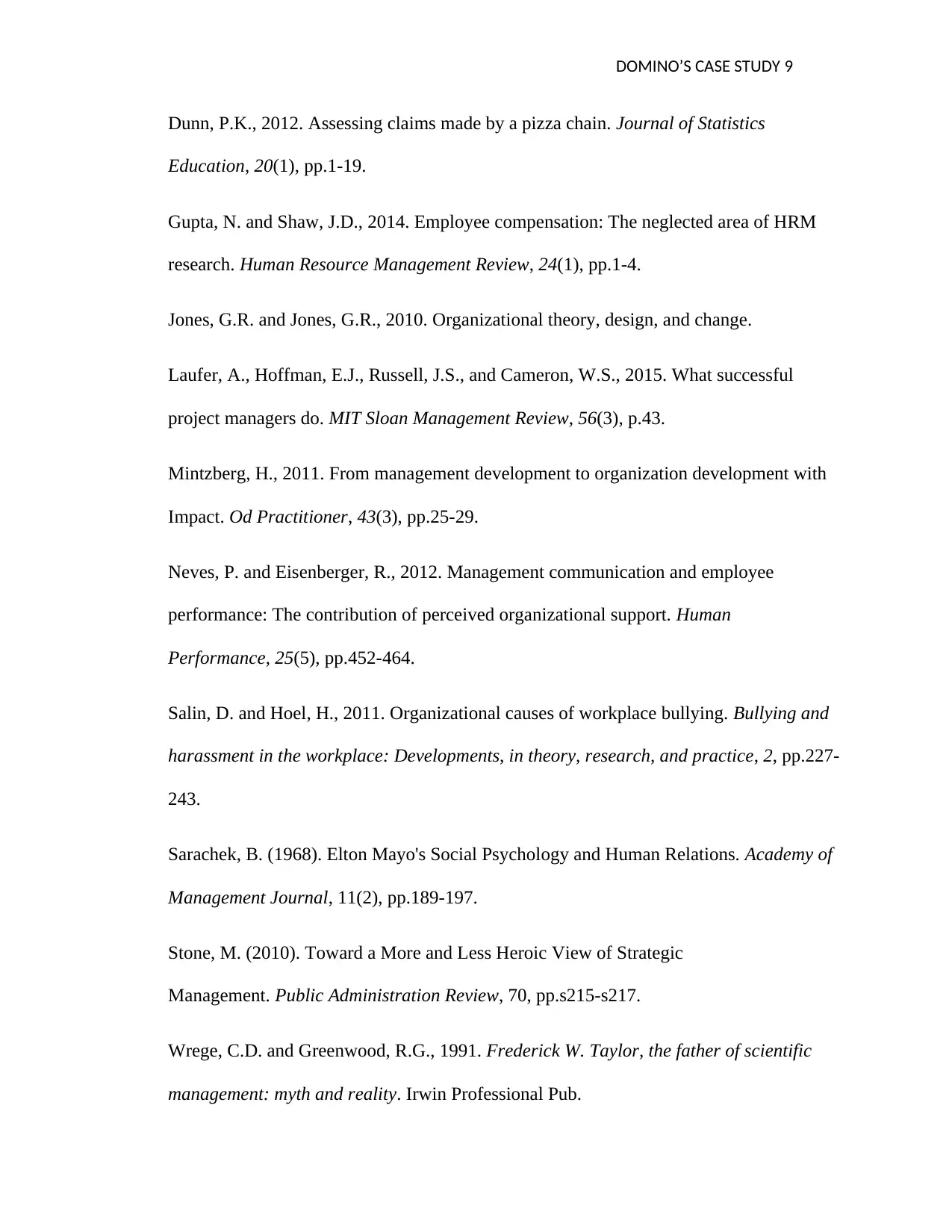
DOMINO’S CASE STUDY 9
Dunn, P.K., 2012. Assessing claims made by a pizza chain. Journal of Statistics
Education, 20(1), pp.1-19.
Gupta, N. and Shaw, J.D., 2014. Employee compensation: The neglected area of HRM
research. Human Resource Management Review, 24(1), pp.1-4.
Jones, G.R. and Jones, G.R., 2010. Organizational theory, design, and change.
Laufer, A., Hoffman, E.J., Russell, J.S., and Cameron, W.S., 2015. What successful
project managers do. MIT Sloan Management Review, 56(3), p.43.
Mintzberg, H., 2011. From management development to organization development with
Impact. Od Practitioner, 43(3), pp.25-29.
Neves, P. and Eisenberger, R., 2012. Management communication and employee
performance: The contribution of perceived organizational support. Human
Performance, 25(5), pp.452-464.
Salin, D. and Hoel, H., 2011. Organizational causes of workplace bullying. Bullying and
harassment in the workplace: Developments, in theory, research, and practice, 2, pp.227-
243.
Sarachek, B. (1968). Elton Mayo's Social Psychology and Human Relations. Academy of
Management Journal, 11(2), pp.189-197.
Stone, M. (2010). Toward a More and Less Heroic View of Strategic
Management. Public Administration Review, 70, pp.s215-s217.
Wrege, C.D. and Greenwood, R.G., 1991. Frederick W. Taylor, the father of scientific
management: myth and reality. Irwin Professional Pub.
Dunn, P.K., 2012. Assessing claims made by a pizza chain. Journal of Statistics
Education, 20(1), pp.1-19.
Gupta, N. and Shaw, J.D., 2014. Employee compensation: The neglected area of HRM
research. Human Resource Management Review, 24(1), pp.1-4.
Jones, G.R. and Jones, G.R., 2010. Organizational theory, design, and change.
Laufer, A., Hoffman, E.J., Russell, J.S., and Cameron, W.S., 2015. What successful
project managers do. MIT Sloan Management Review, 56(3), p.43.
Mintzberg, H., 2011. From management development to organization development with
Impact. Od Practitioner, 43(3), pp.25-29.
Neves, P. and Eisenberger, R., 2012. Management communication and employee
performance: The contribution of perceived organizational support. Human
Performance, 25(5), pp.452-464.
Salin, D. and Hoel, H., 2011. Organizational causes of workplace bullying. Bullying and
harassment in the workplace: Developments, in theory, research, and practice, 2, pp.227-
243.
Sarachek, B. (1968). Elton Mayo's Social Psychology and Human Relations. Academy of
Management Journal, 11(2), pp.189-197.
Stone, M. (2010). Toward a More and Less Heroic View of Strategic
Management. Public Administration Review, 70, pp.s215-s217.
Wrege, C.D. and Greenwood, R.G., 1991. Frederick W. Taylor, the father of scientific
management: myth and reality. Irwin Professional Pub.
⊘ This is a preview!⊘
Do you want full access?
Subscribe today to unlock all pages.

Trusted by 1+ million students worldwide

DOMINO’S CASE STUDY 10
1 out of 10
Your All-in-One AI-Powered Toolkit for Academic Success.
+13062052269
info@desklib.com
Available 24*7 on WhatsApp / Email
![[object Object]](/_next/static/media/star-bottom.7253800d.svg)
Unlock your academic potential
Copyright © 2020–2025 A2Z Services. All Rights Reserved. Developed and managed by ZUCOL.